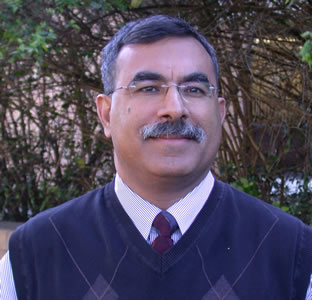UTSA, UTHSCSA Dec. 16 lecture focuses on genetic link to HIV/AIDS susceptibility

UTHSCSA Professor Sunil Ahuja

UTHSCSA Professor Sunil Ahuja
(Dec. 14, 2009)--As the fourth of the Seminars in Translational Research (STRECH), UTSA and the University of Texas Health Science Center at San Antonio will host a seminar featuring UTHSCSA Professor Sunil Ahuja speaking on the genetic link to HIV/AIDS susceptibility. Free and open to the public, the lecture is 4-5 p.m., Wednesday, Dec. 16 in Biotechnology, Sciences and Engineering Building Room 2.102 on the UTSA Main Campus.
Ahuja will speak on "Probing the Complexity of HIV/AIDS Pathogenesis Through Genetics." He will discuss how researchers are using genetic association studies to assess an individual's susceptibility to a variety of diseases. Specifically, he will address how genetic factors influence HIV/AIDS susceptibility and how this information can improve clinical care for HIV-positive patients. He also will discuss challenges in decoding the genetic factors that increase HIV/AIDS susceptibility and how an epigenetic epidemiology approach might be useful in navigating these challenges.
Ahuja joined the Health Science Center in 1996 and is a professor of medicine, microbiology, immunology and biochemistry. Since 2001, he has served as director of the VA Center for HIV and AIDS Infection at the San Antonio-based South Texas Veterans Health Care System. His laboratory and collaborators at Wilford Hall Medical Center have made significant contributions regarding the host genetic factors that influence susceptibility to HIV/AIDS. Their research has been published in prestigious scientific journals such as Science and Nature Immunology. The Health Science Center honored Ahuja with its highest award, the Presidential Distinguished Scholar Award. He also received the 2009 Doris Duke Distinguished Clinical Scientist Award, among other significant awards.
STRECH is a collaborative project between the Health Science Center Institute for Integration of Medicine and Science Novel Clinical and Translational Methodologies, UTSA Research Center in Minority Institutions and the UTSA-Health Science Center graduate program in biomedical engineering. The monthly seminars bring together investigators from the basic, clinical and social sciences to highlight research discoveries from the laboratory bench to the hospital bedside to the community.
For more information, visit the STRECH Web site.
Events
This community event is hosted by the UTSA Mexican American Studies Program. It is a lecture/performance that examines the contributions of Tejana musicians to the evolution of Mexican American music.
Esperanza Peace & Justice Center, 922 San Pedro Ave.This workshop will introduce participants to the basics of text analysis using Python and Jupyter Notebook on the Constellate Lab platform. We will create datasets in Constellate to analyze patterns, trends, and relationships of contents and more.
John Peace Library (JPL 3.02.32), Main CampusWhat would award-winning writing professor Diane Abdo say if it were her last lecture? Join us for our annual Last Lecture series on Wednesday April 17.
Multipurpose Room (BSE 2.102), Main CampusDía en la Sombrilla, formerly Fiesta UTSA, is a festival hosted each spring as a part of Fiesta® San Antonio events. Sponsored by Roadrunner Productions, the event features music, food, confetti, games, event t-shirts, and more.
Sombrilla Plaza and Central Plaza, Main CampusFiesta Arts Fair features contemporary art from more than 100 artists from across the U.S., Fiesta favorite foods, drinks, live music by local and regional performers, and a Young Artists Garden providing opportunities for budding artists to learn, explore and express their creativity.
UTSA Southwest CampusLearn to use Zotero®, a citation manager that can help you store and organize citations you find during your research. Zotero can generate bibliographies in various styles, insert in-text citations and allow you to share sources with collaborators.
Virtual EventCelebrate the accomplishments of College of Education and Human Development, College for Health, Community and Policy, College of Sciences and University College.
Alamodome

